Psy550 research methods - Study guides, Class notes & Summaries
Looking for the best study guides, study notes and summaries about Psy550 research methods? On this page you'll find 63 study documents about Psy550 research methods.
Page 3 out of 63 results
Sort by
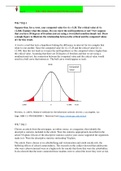
-
WK 7 DQ1 (Elaborated)PSY550-Research Methods-2021
- Exam (elaborations) • 2 pages • 2021
- Available in package deal
-
- $5.49
- + learn more
WK 7 DQ1 (Elaborated)PSY550-Research MethodsWK 7 DQ1 (Elaborated)PSY550-Research Methodsuppose that, for a t-test, your computed value for t is +3.28. The critical value of t is +2.048. Explain what this means. Do you reject the null hypothesis or not? Now suppose that you have 28 degrees of freedom and are using a two-tailed (nondirectional) test. Draw a simple figure to illustrate the relationship between the critical and the computed values of t for this result.Choose an article from the news...

-
WK 1 DQ 2 (Elaborated)PSY550-Research Methods
- Exam (elaborations) • 1 pages • 2021
- Available in package deal
-
- $5.49
- + learn more
WK 1 DQ 2 (Elaborated)PSY550-Research MethodsvWK 1 DQ 2 (Elaborated)PSY550-Research MethodsTopic 1 Discussion 2: Question: Contrast deductive and inductive reasoning and explain how they can each be used to generate a hypothesis.

-
WK 3 DQ 2 (Elaborated)PSY550-Research Methods
- Exam (elaborations) • 1 pages • 2021
- Available in package deal
-
- $5.49
- + learn more
WK 3 DQ 2 (Elaborated)PSY550-Research MethodsWK 3 DQ 2 (Elaborated)PSY550-Research MethodsWK 3 DQ 2 (Elaborated)PSY550-Research MethodsDiscuss what stage in the publication process should potential authors talk about publication credit. Explain. Describe how the sections of a poster, for presentation, are organized

-
WK 6 DQ 2 (Elaborated)PSY550-Research Methods.-2021
- Exam (elaborations) • 1 pages • 2021
- Available in package deal
-
- $5.49
- + learn more
WK 6 DQ 2 (Elaborated)PSY550-Research Methods.WK 6 DQ 2 (Elaborated)PSY550-Research Methods.Lay out the design for two between-subjects experiments: (a) an experiment involving an experimental group and a control group, and (b) a factorial design with three independent variables that have 3, 2, and 2 levels, respectively. A between-subjects experiment would include a control group and an experimental group.

-
WK 6 DQ 2 (Elaborated)PSY550-Research Methods.-2021
- Exam (elaborations) • 1 pages • 2021
- Available in package deal
-
- $5.49
- + learn more
WK 6 DQ 2 (Elaborated)PSY550-Research Methods.WK 6 DQ 2 (Elaborated)PSY550-Research Methods.Lay out the design for two between-subjects experiments: (a) an experiment involving an experimental group and a control group, and (b) a factorial design with three independent variables that have 3, 2, and 2 levels, respectively. A between-subjects experiment would include a control group and an experimental group.
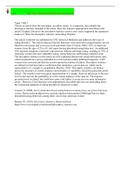
-
WK 7 DQ 2 (Elaborated)PSY550-Research Methods-2021
- Exam (elaborations) • 1 pages • 2021
- Available in package deal
-
- $5.49
- + learn more
WK 7 DQ 2 (Elaborated)PSY550-Research MethodsWK 7 DQ 2 (Elaborated)PSY550-Research MethodsTopic 7 DQ 2 Choose an article from the newspaper, an online source, or a magazine, then identify the descriptive statistics included in the article. Were the statisitcs appropriately described in the article? Explain. Discuss if the descriptive statistics used in your source supported the arguments made in it. Were the descriptive statistics misleading? Explain.
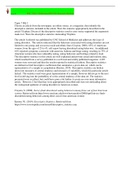
-
WK 7 DQ 2 (Elaborated)PSY550-Research Methods-2021
- Exam (elaborations) • 1 pages • 2021
- Available in package deal
-
- $6.19
- + learn more
WK 7 DQ 2 (Elaborated)PSY550-Research MethodsWK 7 DQ 2 (Elaborated)PSY550-Research MethodsTopic 7 DQ 2 Choose an article from the newspaper, an online source, or a magazine, then identify the descriptive statistics included in the article. Were the statisitcs appropriately described in the article? Explain. Discuss if the descriptive statistics used in your source supported the arguments made in it. Were the descriptive statistics misleading? Explain.
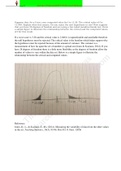
-
vwk6 dq 2 (Elaborated)PSY550-Research Methods
- Exam (elaborations) • 1 pages • 2021
- Available in package deal
-
- $5.49
- + learn more
wk6 dq 2 (Elaborated)PSY550-Research Methodswk6 dq 2 (Elaborated)PSY550-Research Methodswk6 dq 2 (Elaborated)PSY550-Research MethodsSuppose that, for a t-test, your computed value for t is +3.28. The critical value of t is +2.048. Explain what this means. Do you reject the null hypothesis or not? Now suppose that you have 28 degrees of freedom and are using a two-tailed (nondirectional) test. Draw a simple figure to illustrate the relationship between the critical and the computed values of t fo...
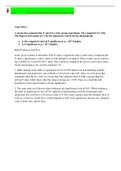
-
WK 8 DQ 2 (Elaborated)PSY550-Research Methods.-2021
- Exam (elaborations) • 1 pages • 2021
- Available in package deal
-
- $5.49
- + learn more
WK 8 DQ 2 (Elaborated)PSY550-Research Methods.WK 8 DQ 2 (Elaborated)PSY550-Research Methods.A researcher computed the F ratio for a four-group experiment. The computed F is 4.86. The degrees of freedom are 3 for the numerator and 16 for the denominator. 1. Is the computed value of F significant at p < .05? Explain. 2. Is it significant at p < .01? Explain
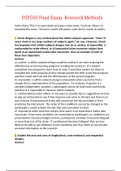
-
PSY550 Final Exam: Research Methods,100% CORRECT
- Exam (elaborations) • 6 pages • 2021
-
- $15.49
- + learn more
Instructions: This is an open-book and open-notes exam. You have 2hours to complete the exam. The test is worth 100 points; each item is worth 10 points. 1. Chuck Wagon is very excited about the within-subjects approach. “Now I’ll never need to run large numbers of subjects again,” he says. However, Chuck has forgotten that within-subjects designs may be a) useless, b) impossible, c) confounded by order effects, or d) impractical when excessive subject time spent in an experiment makes ...

That summary you just bought made someone very happy. Also get paid weekly? Sell your study resources on Stuvia! Discover all about earning on Stuvia


